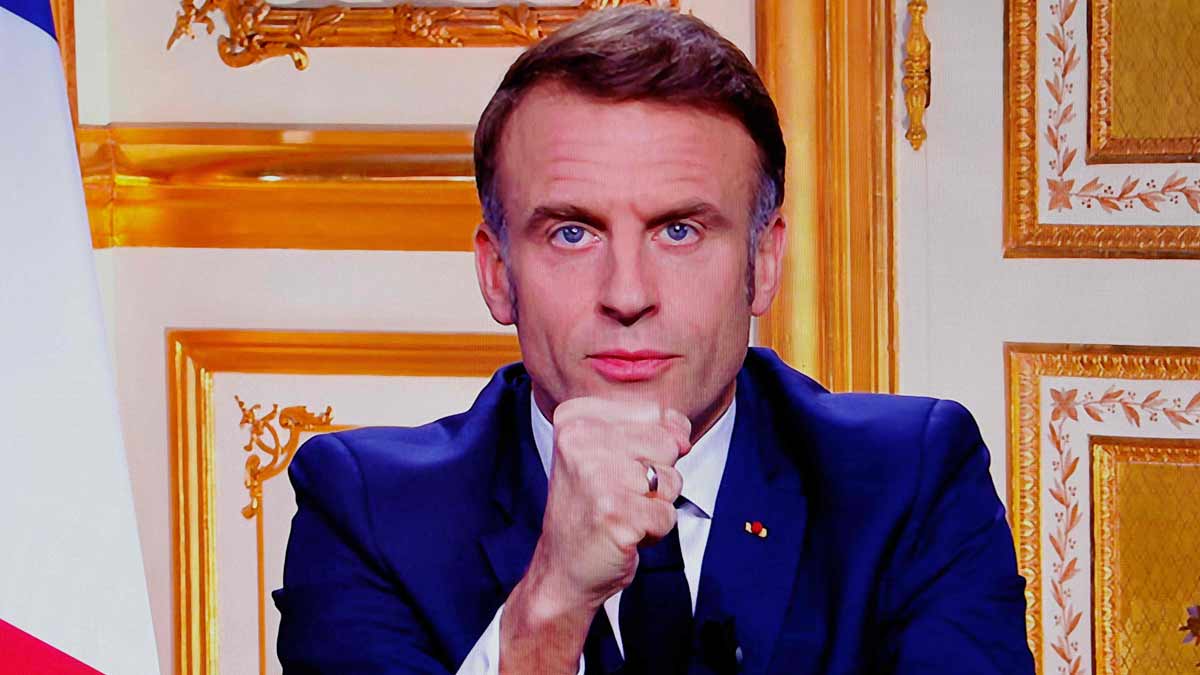Why France, a G7 nation, is recognising Palestinian state amid Israel-Hamas conflict?
 French President Emmanuel Macron is seen on monitors as he addresses the nation during a televised broadcast from the presidential Elysee Palace | AFP
French President Emmanuel Macron is seen on monitors as he addresses the nation during a televised broadcast from the presidential Elysee Palace | AFP
French President Emmanuel Macron has announced that France will formally recognise a Palestinian state later this year, marking a significant shift in Western diplomacy and a break from the traditional caution of the G7 group of advanced economies.
The decision was first revealed in a letter yesterday to Palestinian Authority President Mahmoud Abbas, which Macron also shared publicly on social media. In the letter, he stated that France would make its recognition official during the United Nations General Assembly session in September.
“True to its historic commitment to a just and lasting peace in the Middle East, I have decided that France will recognise the state of Palestine,” Macron wrote. He added that the immediate priority must be an end to the war in Gaza, alongside humanitarian access, the release of hostages and the disarmament of Hamas.
France becomes the first G7 country to recognise Palestinian statehood. The G7 includes the US, UK, Germany, Japan, Italy, Canada and France. While nearly half the G20 already recognises Palestine, major Western powers have so far hesitated to do so.
In his letter to Abbas, Macron expressed support for a two-state solution that respects the aspirations of Palestinians, ensures Israel’s security and brings an end to all forms of violence and terrorism. He praised Abbas for calling on Hamas to disarm, release hostages and withdraw from Gaza. Abbas has also pledged reforms and elections within the Palestinian Authority, which governs parts of the West Bank.
French Foreign Minister Jean-Noël Barrot confirmed that Macron’s letter had been delivered to the Palestinian consul in Jerusalem and said he would reaffirm France’s position at the UN immediately.
France’s move follows similar recognitions by Ireland, Spain and Norway last year. Yet it carries far greater weight. France is the only EU country with a permanent seat on the UN Security Council, a nuclear power and home to the largest Jewish and Muslim populations in Western Europe.
A senior official at the Élysée Palace suggested other nations may soon follow. “I’ve had other colleagues on the phone and I’m sure we won’t be the only ones recognising Palestine in September.”
France had previously planned a broader diplomatic push. In June, France and Saudi Arabia were set to co-host a summit in Riyadh aiming for joint recognition of Palestinian statehood. That plan was derailed by the outbreak of hostilities between Israel and Iran just days before the summit.
Despite this setback, Macron decided to move ahead unilaterally, seemingly betting that other allies would fall into line. Within France, where public opinion is largely sympathetic to the Palestinian cause, the move is unlikely to face major opposition.
France’s position has evolved in recent months. Macron initially supported Israel’s right to retaliate after the October 2023 attacks by Hamas. But as the war in Gaza intensified, he became increasingly critical of Israeli Prime Minister Benjamin Netanyahu’s conduct. France suspended arms exports to Israel, organised aid drops into Gaza and repeatedly urged for a ceasefire and humanitarian access.
The French president has also voiced concern about importing the conflict into France, given its complex social fabric and history of tensions between Jewish and Muslim communities. His government has sought to balance domestic stability with a principled foreign policy.
Israeli leaders have reacted angrily. Netanyahu, a long-time opponent of Palestinian statehood, said the move “rewards terror” and accused Macron of enabling Hamas. Justice Minister Yariv Levin called the decision “a black mark on France’s history” and urged Israel to annex the West Bank, using the Israeli term “Judea and Samaria.” “The Land of Israel belongs to the people of Israel,” Levin said. “Even President Macron’s declaration cannot change that.”
The United States also rejected the announcement. Secretary of State Marco Rubio wrote on social media that Macron’s decision “only serves Hamas propaganda and sets back peace.” The US and Israel had earlier walked away from ceasefire talks in Qatar, blaming Hamas for lack of cooperation.
Palestinian officials welcomed the French move. Palestinian Authority Vice President Hussein al-Sheikh thanked Macron for what he described as a courageous act. Hamas issued a statement praising the decision as “a positive step towards justice” and said it reflected growing international recognition of Palestinian rights.
Macron’s critics argue that the recognition risks diplomatic capital and could isolate France from key allies, particularly the US. Relations between Paris and Washington have already been strained over issues including Ukraine, trade tariffs and personal clashes between Macron and President Donald Trump.
The British government, under Prime Minister Keir Starmer, has expressed support for Palestinian statehood but insists recognition should come after a ceasefire and as part of a broader peace process. “A ceasefire will put us on a path to the recognition of a Palestinian state and a two-state solution which guarantees peace and security for Palestinians and Israelis,” Starmer said.
Middle East